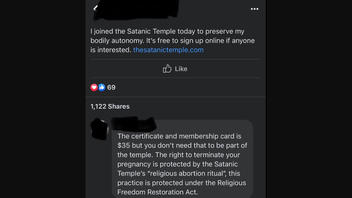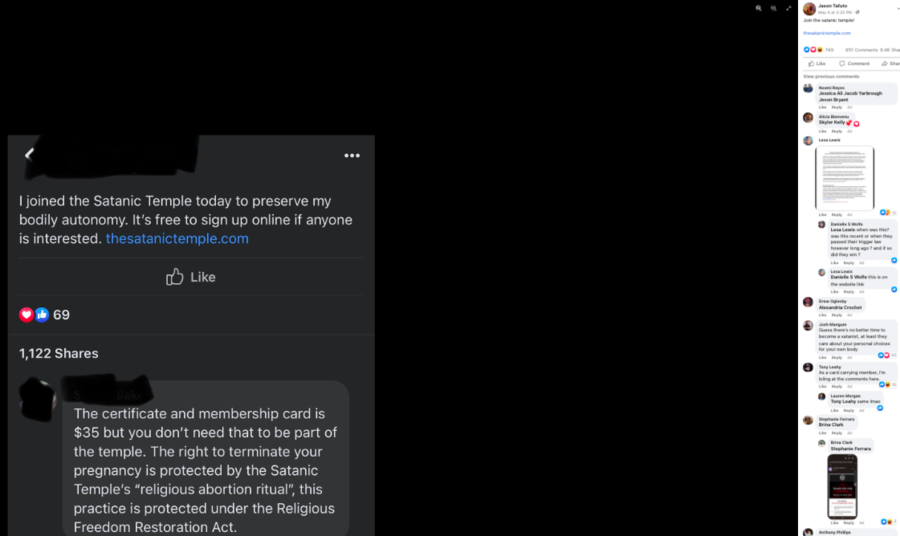
Does joining The Satanic Temple give a member legal protection to terminate a pregnancy? Not necessarily: According to legal experts, it could -- but joining "opportunistically" probably won't be applicable. Or as Mark Tushnet, the William Nelson Cromwell Professor of Law emeritus at Harvard Law School, wrote in an email to Lead Stories on May 4, 2022, such a claim is "not quite false [technically accurate in at least some cases] but more than a little misleading."
The claim appeared in a Facebook post on May 4, 2022, with the caption "Join the satanic temple!" It opens:
I joined the Satanic Temple today to protect my bodily autonomy. It's free to sign up online if anyone is interested. thesatanictemple.com
This is what the post looked like on Facebook at the time of writing:
Text in the post said, "The right to terminate your pregnancy is protected by the Satanic Temple's 'religious abortion ritual,' this practice is protected under the Religious Freedom Restoration Act."
The Satanic Temple, a Salem, Massachusetts-based organization, claims abortions for its members would be a sacred ritual and protected under the Religious Freedom Restoration Act (RFRA).
Founded in 2013, The Satanic Temple received tax-exempt status in 2019 by the IRS. It's a "non-theist" religion, meaning it's not based on a belief in a god or gods. The group's mission, according to its website, is to:
To Encourage Benevolence And Empathy, Reject Tyrannical Authority, Advocate Practical Common Sense, Oppose Injustice, And Undertake Noble Pursuits.
The group says on its website that it has "provided religious exemption and legal protections against laws that unscientifically restrict women's reproductive autonomy."
Since Supreme Court Justice Samuel Alito's leaked draft decision on Roe v. Wade was published by Politico on May 2, 2022, there has been a surge of social media posts urging people to join The Satanic Temple, such as these Twitter posts here and here.
In an email to Lead Stories on May 11, 2022, Ric Simmons, the Chief Justice Thomas J. Moyer Professor at the Moritz College of Law at Ohio State University, wrote that RFRA would not likely be a substantial enough claim:
Laws that ban or restrict abortion apply indiscriminately to everyone, so there would be no religious exemption to them under the first amendment, and it would be difficult to argue that obeying the law would create a substantial burden to exercising their religion (it may, of course, impose a substantial burden on women generally, but that is not RFRA's test).
Tushnet wrote in detail to explain the full complexity of this issue
- If the new member holds the beliefs associated with the Satanic Temple sincerely, and not opportunistically, she would be able to claim protection under the federal RFRA for actions against her by the federal government (not at all likely under current statutes because there aren't many federal statutes regulating those who have abortions) and under state RFRAs where they exist (in about 20 states, I believe, but of course, you should check).
- A sincere belief would trigger RFRA protections but that doesn't mean that the action would in fact be protected. All RFRAs allow the government to override the religious belief for compelling reasons, and governments would certainly argue that protecting what they regard as human life is a compelling reason. I'm reasonably confident that the governments would prevail on that ground -- so, in the end, I think it unlikely that joining the Satanic Temple would actually provide protection against prosecution for having an abortion.
- In addition, the point in #1 about "sincerity" is important. Courts have been reluctant to find that a litigant isn't sincere in asserting her religious beliefs, but everyone's aware of the fact that the more personal benefit you get from the claim, the more likely it is that you're not sincere in asserting what your beliefs are. I think there's a decent change that many judges would find that people who joined the Satanic Temple recently and didn't do anything else weren't sincere -- but again that might vary depending on what each individual member actually does.
Samuel D. Brunson, the Georgia Reithal professor at the Loyola University Chicago School of Law, wrote in an email on May 11, 2022, that he's "pretty sure that the Satanic Temple is positioning itself to challenge anti-abortion legislation in various states."
The federal Religious Freedom Restoration Act, as well as most (if not all) state-level RFRAs don't say that the government cannot infringe on a person's free exercise rights under any circumstance at all. Rather, they say that to infringe on an individual's religious practice, the government must have a compelling governmental interest and the law it enacts must be the least restrictive means of furthering that interest.
Is it possible that a member of the Satanic Temple can successfully challenge laws against abortion based on a religious belief in bodily autonomy? Yes, it is possible. But I suspect that the state would have the better argument.
As much as we want an easy, costless way to deal with potential anti-abortion laws in a post-Roe world, something that seems easy and slick and too cute by half is probably not going to work. Protecting a woman's right to choose is, rather, going to require us to do the hard work of demonstrating, writing to representatives, and voting for people (at the federal and state levels) who will ensure that that right is protected.
the Satanic Temple's approach is clever. And it highlights a real inconsistency among people who insist both on untrammeled religious liberty and prohibitions on abortion. But joining the Satanic Temple is unlikely to allow an individual in, for instance, Texas or Louisiana ignore state abortion bans.



















